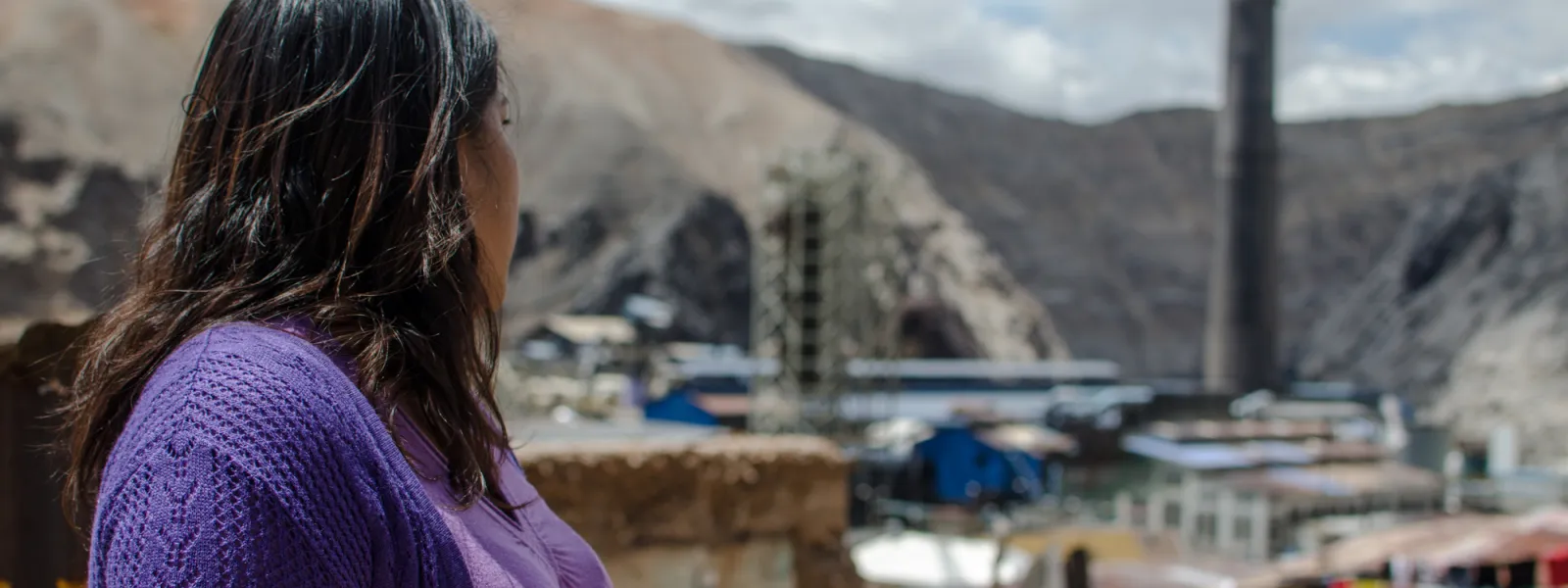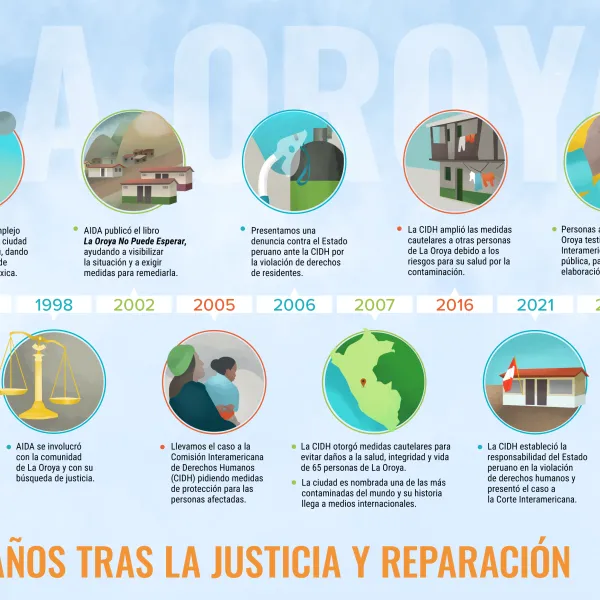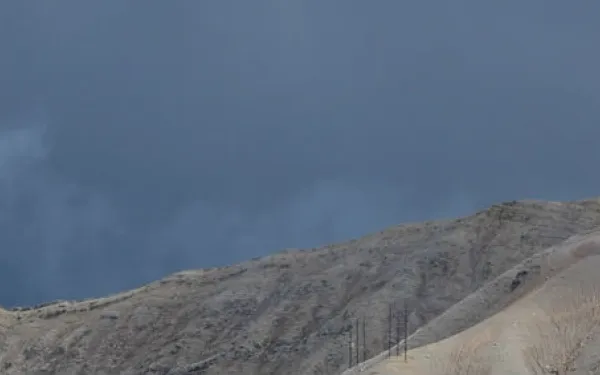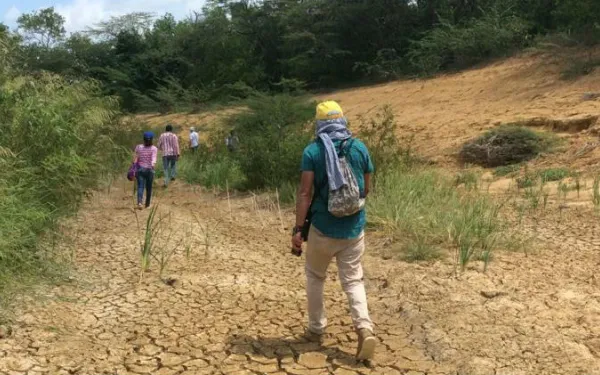
Project
Protecting the health of La Oroya's residents from toxic pollution
For more than 20 years, residents of La Oroya have been seeking justice and reparations after a metallurgical complex caused heavy metal pollution in their community—in violation of their fundamental rights—and the government failed to take adequate measures to protect them.
On March 22, 2024, the Inter-American Court of Human Rights issued its judgment in the case. It found Peru responsible and ordered it to adopt comprehensive reparation measures. This decision is a historic opportunity to restore the rights of the victims, as well as an important precedent for the protection of the right to a healthy environment in Latin America and for adequate state oversight of corporate activities.
Background
La Oroya is a small city in Peru’s central mountain range, in the department of Junín, about 176 km from Lima. It has a population of around 30,000 inhabitants.
There, in 1922, the U.S. company Cerro de Pasco Cooper Corporation installed the La Oroya Metallurgical Complex to process ore concentrates with high levels of lead, copper, zinc, silver and gold, as well as other contaminants such as sulfur, cadmium and arsenic.
The complex was nationalized in 1974 and operated by the State until 1997, when it was acquired by the US Doe Run Company through its subsidiary Doe Run Peru. In 2009, due to the company's financial crisis, the complex's operations were suspended.
Decades of damage to public health
The Peruvian State - due to the lack of adequate control systems, constant supervision, imposition of sanctions and adoption of immediate actions - has allowed the metallurgical complex to generate very high levels of contamination for decades that have seriously affected the health of residents of La Oroya for generations.
Those living in La Oroya have a higher risk or propensity to develop cancer due to historical exposure to heavy metals. While the health effects of toxic contamination are not immediately noticeable, they may be irreversible or become evident over the long term, affecting the population at various levels. Moreover, the impacts have been differentiated —and even more severe— among children, women and the elderly.
Most of the affected people presented lead levels higher than those recommended by the World Health Organization and, in some cases, higher levels of arsenic and cadmium; in addition to stress, anxiety, skin disorders, gastric problems, chronic headaches and respiratory or cardiac problems, among others.
The search for justice
Over time, several actions were brought at the national and international levels to obtain oversight of the metallurgical complex and its impacts, as well as to obtain redress for the violation of the rights of affected people.
AIDA became involved with La Oroya in 1997 and, since then, we’ve employed various strategies to protect public health, the environment and the rights of its inhabitants.
In 2002, our publication La Oroya Cannot Wait helped to make La Oroya's situation visible internationally and demand remedial measures.
That same year, a group of residents of La Oroya filed an enforcement action against the Ministry of Health and the General Directorate of Environmental Health to protect their rights and those of the rest of the population.
In 2006, they obtained a partially favorable decision from the Constitutional Court that ordered protective measures. However, after more than 14 years, no measures were taken to implement the ruling and the highest court did not take action to enforce it.
Given the lack of effective responses at the national level, AIDA —together with an international coalition of organizations— took the case to the Inter-American Commission on Human Rights (IACHR) and in November 2005 requested measures to protect the right to life, personal integrity and health of the people affected. In 2006, we filed a complaint with the IACHR against the Peruvian State for the violation of the human rights of La Oroya residents.
In 2007, in response to the petition, the IACHR granted protection measures to 65 people from La Oroya and in 2016 extended them to another 15.
Current Situation
To date, the protection measures granted by the IACHR are still in effect. Although the State has issued some decisions to somewhat control the company and the levels of contamination in the area, these have not been effective in protecting the rights of the population or in urgently implementing the necessary actions in La Oroya.
Although the levels of lead and other heavy metals in the blood have decreased since the suspension of operations at the complex, this does not imply that the effects of the contamination have disappeared because the metals remain in other parts of the body and their impacts can appear over the years. The State has not carried out a comprehensive diagnosis and follow-up of the people who were highly exposed to heavy metals at La Oroya. There is also a lack of an epidemiological and blood study on children to show the current state of contamination of the population and its comparison with the studies carried out between 1999 and 2005.
The case before the Inter-American Court
As for the international complaint, in October 2021 —15 years after the process began— the IACHR adopted a decision on the merits of the case and submitted it to the Inter-American Court of Human Rights, after establishing the international responsibility of the Peruvian State in the violation of human rights of residents of La Oroya.
The Court heard the case at a public hearing in October 2022. More than a year later, on March 22, 2024, the international court issued its judgment. In its ruling, the first of its kind, it held Peru responsible for violating the rights of the residents of La Oroya and ordered the government to adopt comprehensive reparation measures, including environmental remediation, reduction and mitigation of polluting emissions, air quality monitoring, free and specialized medical care, compensation, and a resettlement plan for the affected people.
Partners:

Related projects

Letters to the Inter-American Commission 10 years after the admission of the case of La Oroya
In a letter to the Inter-American Commission on Human Rights (IACHR) on the tenth anniversary of the admission of their case, people affected by heavy metal poisoning in La Oroya, Peru call on the Commission to issue the Merit Report on the case. This step implies the hope of achieving justice in the face of the human rights violations the residents of La Oroya have been suffering for more than a decade. The case of La Oroya was the first to demonstrate the serious problem of heavy metal pollution in Peru and the first to be brought before an international mechanism. Seeing as instances of heavy metal pollution have increased in the country due to mining and oil activities, the resolution of the case of La Oroya in favor of the affected people is vital to promoting a comprehensive public policy on the subject, which should be adequately implemented in compliance with Peru's international human rights obligations. That is why, together, AIDA and the Association for Human Rights (APRODEH)—which legally represent the affected people—as well as the National Platform of People Affected by Metals, Metalloids and Other Toxic Chemicals and the Technical Board on Human and Environmental Health, reiterate the community's request for justice through two accompanying letters, also addressed to the Commission. Letter from the affected residents of La Oroya "Today we know that our body is contaminated, but we don't know what the adequate treatment is for its recovery, despite daily suffering... Our case demonstrates the problem of heavy metal contamination that has been manifested across the country, in the face of which a prompt and adequate response from the Commission would not only contribute to positively transforming our realities and guaranteeing our rights, but would also allow for new paths toward justice and environmental health for the thousands of people currently affected by toxic metals in Peru..." Read the Letter (in Spanish) Letter from AIDA and APRODEH "... it's important to reiterate that case of La Oroya not only constitutes, in itself, an urgent and relevant case for the petitioners and for the mandate of the Commission, it is also an emblematic and strategic case in the context of Peru. A pronouncement from the Commission in the case of La Oroya, which would obligate the Peruvian government and send the case before the Inter-American Court, could create an important antecedent and provide guidelines for Peruvian cause, contributing to the guarantee of rights for various communities throughout the country, which have been grouped together in the National Platform of People Affected by Heavy Metals in Peru. Together, their main demands are the creation of a public policy for those affected by heavy metals, and the created of a multi-sectorial commission to bring attention to the problem..." Read the Letter (In Spanish) Letter from the National Platform of People Affected by Heavy Metals and the Technical Board on Human and Environmental Health "A timely statement from the Inter-American Commission on Human Rights on the Merit Report of the case of La Oroya would contribute to granting justice to dozens of families in that community who, over the past decade, have dedicated much of their lives to the defense of their health and of a healthy environment. It would also serve as an important antecedent for the Peruvian State to stop diluting the management of this situation and to implement the measures needed to attend to the environmental and public health problem associated with heavy metal pollution and, in this way, advance in compliance with its international human rights obligations..." Read the Letter (in Spanish)
Read more
Coal or life: Walking where a stream once ran
The appointment was on a hot Sunday in July. Together with Wayuu indigenous and Afro-descendant communities displaced by coal mining, members of social and human rights organizations, employees of Cerrejón, and government officials, I walked for more than five hours over the barren land where the Bruno Stream once ran. What I saw in my path were the remains of snails that died of thirst, stuck to the mud, and the lifeless body of a tigrillo that showed us so clearly what mustn’t happen again. The Bruno is a vein of water that once irrigated the department of La Guajira, located in Colombia’s far north, a region hit years ago by extreme drought. It is a major tributary of the Ranchería River, one of the department’s most important water sources, and forms part of the underground water systems that have long given life to the region’s communities. It was painful to walk where the Bruno once flowed free, and to think—while doing so—that what is now a dry riverbed was once abundant with life. That Sunday, we also toured the area intended to be the artificial channel of the stream. In 2014, the National Environmental Licensing Authority authorized Cerrejón to divert 3.6 kilometers of Bruno’s flow to favor ongoing coal exploitation in La Guajira. Several things made on impact on me that day. One of them was that, although the rivers belong to us all and natural water sources are public, we were accompanied the entire time by employees of the company. While walking the stream, we entered the land “owned” by the coal-mining concessionaire. Communities that used to travel freely along the banks of the stream can no longer do so today. Although the Bruno is one of few streams in Colombia’s driest department and one of the scarce sources of fresh water for communities living there, its channel was clogged and diverted to facilitate mining. An engineering project has altered one of the most important streams for a thirsty region and created an artificial path through which not a single drop of water flows. “If they carry water, they’re rivers; if not, they’re roads,” a verse from Guatemalan indigenous poet Humberto Ak’abal teaches us. The new “channel” of the Bruno is not a river, but “a barren road” attesting to the deterioration of a sensitive ecosystem. The “road” does not recover or mitigate the damages from the stream’s diversion. On the contrary, it produces new ones. The world is facing a climate crisis, and coal mining is one of its primary causes. While many countries are replacing the use of coal in their energy matrices with cleaner options, Colombia has decided to dry up a river to exploit more and more coal. Walking paths of justice The day after the walk, the frustration of the absurd did not prevent me from embracing a glimmer of hope. On Monday, I joined representatives of indigenous communities and local organizations at a public hearing convened by several Congressmen to discuss what happened with the Bruno. The strength and dignity of their words, in which decades of resistance were encrypted, fed my soul. “This territory is ours, our rivers are our life and we care for life—for our children, for our present, for our future and that of the world.” As it has done many times before, La Guajira spoke to the country and the world. They told the Congressmen that it’s not possible to prioritize the use of water for mining over human consumption. They warned that the country must transition to an energy production that doesn’t cause the damages that coal mining has to the climate, human rights, and the species and ecosystems that sustain us. The stream must return to its channel, the snails must drink again from its waters, and no tigrillo should die due to the intentional destruction of its natural habitat. In a 2017 ruling, the Constitutional Court demonstrated that uncertainties exist as to the environmental and social impacts of the Bruno Stream riverbed modification project. The Court ordered the creation of an Inter-Institutional working group to resolve the complaints of the affected people. Communities will continue to demand compliance with that ruling and demonstrate that the uncertainties are, in fact, certain damages that will continue to undermine their lives. AIDA, along with our partner organizations, will continue to accompany this struggle to demonstrate the harms of coal mining and promote clean alternatives that respect both people and the environment.
Read more
Infographic: Lakes Poopó and Uru Uru, at-risk Bolivian wetlands
Located in the central-eastern Bolivian highlands, lakes Poopó and Uru Uru are important sources of water for indigenous and rural communities and the area's planet and animal life. Both ecosystems, considered Wetlands of International Importance under the Ramsar Convention, are at serious risk due to mining activity, river diversion and the climate crisis.
Read more